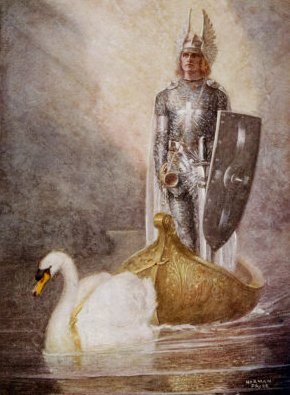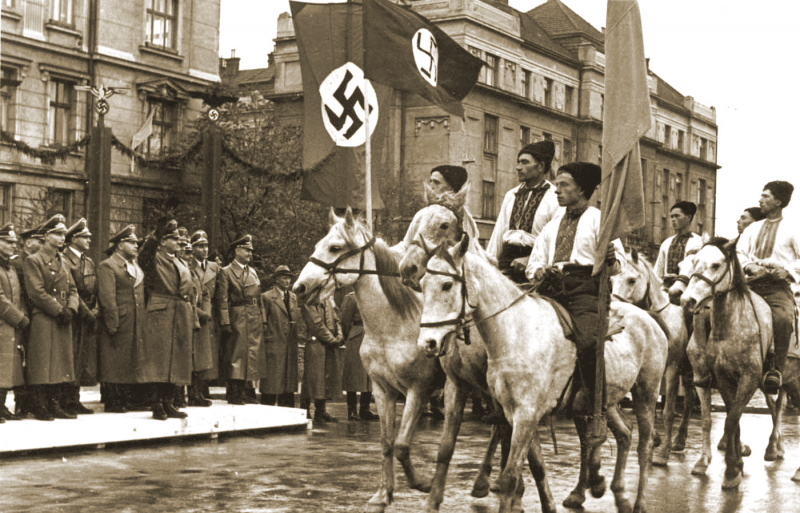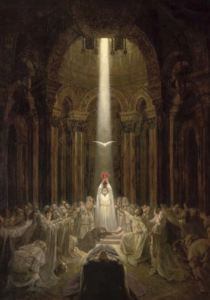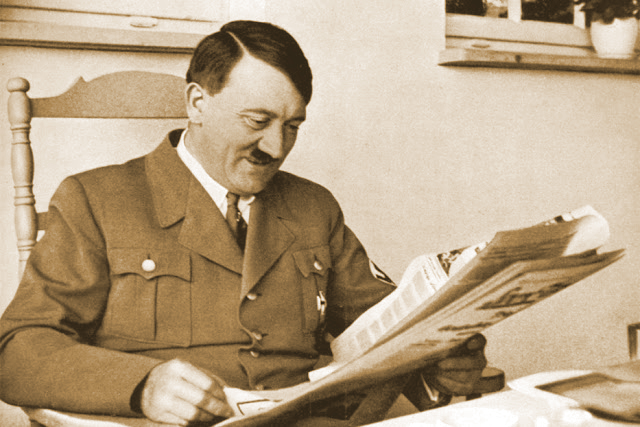(excerpts)
by Richard Weikart
Who influenced Hitler’s religion? Even as allied bombers reduced German cities to rubble in 1944, Hitler fantasized about his post-war architectural exploits. One of his most grandiose schemes was to transform his hometown of Linz, Austria, into the cultural capital of the Third Reich. A secretary of his remembered this as one of Hitler’s favorite topics of conversation. On May 19, 1944, Hitler regaled his entourage with his plans for Linz, which included a huge library. Inside a large hall of the library, he planned to display the busts of “our greatest thinkers,” whom he considered vastly superior to any English, French, or Americans intellectuals…
Hitler enthused about Nietzsche, however, asserting: “Nietzsche is the more realistic and more consistent one. He certainly sees the grief of the world and the human race, but he deduces from it the demand of the Superman (Übermensch), the demand for an elevated and intensified life. Thus Nietzsche is naturally much closer to our viewpoint than Schopenhauer, even though we may appreciate Schopenhauer in some matters”…
In this chapter, I highlight several of the most important thinkers who impacted his perspective: Schopenhauer, Nietzsche, Richard Wagner, Houston Stewart Chamberlain, and Julius Friedrich Lehmann… He [Hitler] advised that all German young people should read the works of Goethe, Schiller, and Schopenhauer…
Rosenberg jotted down in his diary that Hitler once cited Schopenhauer as the source of the saying that “antiquity did not know two evils: Christianity and syphilis.” (Rosenberg, a Schopenhauer adept, apparently was not sure if this was really a Schopenhauer quote, for he placed a question mark by it.) Goebbels recorded the same conversation in his diary, but he remembered Hitler saying, “According to Schopenhauer, Christianity and syphilis made humanity unhappy and unfree.” Either way, Hitler saw Schopenhauer as an opponent of Christianity and was agreeing with his anti-Christian outlook.
Then there was Nietzsche…
According to Max Whyte, “For many intellectuals in the Third Reich, Nietzsche provided not merely the decorative furnishing of National Socialism, but its core ideology.” The official Nazi newspaper published articles honoring Nietzsche, and they “applauded Nietzsche’s ‘battle against Christianity.’” In his 1936 speech to the Nazi Party Congress, the party ideologist, Rosenberg, identified Nietzsche as one of three major forerunners of Nazism. The following year, Heinrich Härtle published Nietzsche und der Nationalsozialismus (Nietzsche and National Socialism) with the official Nazi publishing house. He admitted that some of Nietzsche’s political perspectives were problematic from a Nazi standpoint, but his final verdict was that Nietzsche was an important forerunner of Nazism…
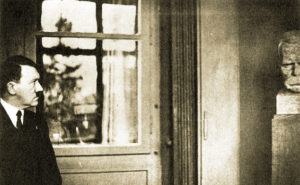
On his visit to the Nietzsche Archive in October 1934, he brought along his architect friend, Albert Speer, and commissioned the building of a memorial hall, where conferences and workshops could be held to promote Nietzschean philosophy. The project cost Hitler 50,000 marks from his private funds and was almost completed by the end of World War II. During that same visit, Hitler’s personal photographer, Heinrich Hoffmann, took a photo that circulated widely of Hitler gazing on the bust of Nietzsche.
On Mussolini’s sixtieth birthday in 1943, Hitler presented him a special edition of Nietzsche’s works… Hitler’s friend, Ernst Hanfstaengl, claimed that when he heard Hitler give his March 21, 1933, speech in Potsdam, he detected a shift in Hitler’s thought. Hanfstaengl wrote,
I pulled myself together with a start. What was this? Where had I read that before? This was not Schopenhauer, who had been Hitler’s philosophical god in the old Dietrich Eckart days. No, this was new. It was Nietzsche… From that day at Potsdam the Nietzschean catch-phrases began to appear more frequently—the will to power of the Herrenvolk [master people], slave morality, the fight for the heroic life, against reactionary education, Christian philosophy and ethics based on compassion.
At the 1933 Nuremberg Party Congress, Hitler endorsed the Nietzschean transvaluation of values, i.e., Nietzsche’s rejection and inversion of traditional Judeo-Christian morality…
While never endorsing the “death of God,” Hitler expressed agreement with Nietzsche’s rejection of Christianity. In January 1941, Goebbels recorded in his diary that Hitler was riled up against scholars, including philosophers, but he made an exception for Nietzsche, who, he asserted, “proved in detail the absurdity of Christianity. In two hundred years it [i.e., Christianity] will only remain a grotesque memory.” Thus, Hitler approved of Nietzsche’s anti-Christian stance and predicted the ultimate demise of Christianity.
Schopenhauer and Nietzsche were also potent influences on Richard Wagner, Hitler’s favorite composer. In fact, Hitler’s enthusiasm for Wagner was well known. The Führer regularly attended the Bayreuth Festival and forged personal connections with the Wagner family and the Bayreuth Circle, who were powerful influences on the racist and anti-Semitic scene in early twentieth-century Germany…
Wagner did not believe that Jesus rose from the dead… In 1881 he read Gobineau and adopted his racist theory at once, calling him “one of the cleverest men of our day.” He embraced Gobineau’s view that race was the guiding factor behind historical development. Further, the key problem with humanity—the primary sin—was that the white race, the Aryans, had mixed with other races, contaminating their blood. Gobineau’s theory would have a powerful impact on German racial thought by the early twentieth century and would help shape Hitler’s worldview, possibly through Wagner or the Bayreuth Circle, but likely also through other racist writers.
Another Schopenhauer devotee and Wagner’s son-in-law, Houston Stewart Chamberlain, was an important precursor of Nazi racial ideology. When Hitler was in Bayreuth for a speaking engagement, he requested an appointment with Chamberlain, so they met for the first time on September 30 and October 1, 1923. A few days after that first meeting, Chamberlain wrote excitedly to his new acquaintance, expressing his great admiration for Hitler. Until his death in January 1927, Chamberlain remained his devoted supporter. A few days after attending Chamberlain’s funeral, Hitler told a Nazi Party assembly that Chamberlain was a “great thinker.” Many Nazi speakers and publications, including the Völkischer Beobachter, feted Chamberlain as the preeminent racial thinker…
The parallels between some of Chamberlain’s and Hitler’s ideas are patently obvious, such as Germanic racial supremacy, anti-Semitism, and the constant struggle between races. Both men believed that Indo-Germanic people were the sole creators of higher culture. However, these ideas were circulating widely in Germany independently of Chamberlain…
According to Rosenberg’s diary entry, Hitler agreed with Rosenberg that Chamberlain was mistaken to defend Paul’s teachings. To be sure, Chamberlain thought Paul’s writings were riddled with contradictions, and he spurned Paul’s Epistle to the Romans because he viewed it as a continuation of the Jewish conception of a God who “creates, commands, forbids, becomes angry, punishes, and rewards.” Nonetheless, Chamberlain insisted that many passages in Paul evince a more refreshing, mystical approach to God. Hitler, on the other hand, rejected Paul altogether, as the account of the same conversation recorded in Hitler’s monologues made clear.
______ 卐 ______
Editor’s comment:
At the 1933 Nuremberg Party Congress, Hitler endorsed the Nietzschean transvaluation of values, i.e., Nietzsche’s rejection and inversion of traditional Judeo-Christian morality…
Since the author of this book is a Christian, his prose doesn’t reveal the truth.
It was Christianity, a Semitic ideology, that inverted Greco-Roman values. Nietzsche and Hitler’s NS only wanted European values to return to their Aryan roots.
